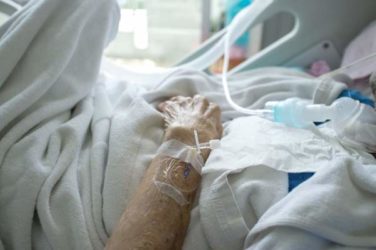FROM JOURNAL OF CLINICAL ONCOLOGY
Risk of non–small cell lung cancer progression is reduced by 63% for patients with epidermal growth factor receptor mutations who take tyrosine kinase inhibitors over chemotherapy, and the benefit is 50% greater for those with exon 19 deletions compared with exon 21 leucine to arginine substitutions, according to a meta-analysis published online April 20 in the Journal of Clinical Oncology.
More than 90% of epidermal growth factor receptor (EGFR) mutations in tumors of non–small cell lung cancer (NSCLC) patients are so-called common mutations of exon 19 deletion or exon 21 L858R substitution, and while both mutations are recognized as predicting benefit with EGFR TKIs, this meta-analysis of seven studies of NSCLC patients with the mutations (56% exon 19 deletions and 44% L858R), showed 50% greater relative benefit in progression free survival (PFS) for patients with exon 19 deletions relative to L858R (HR, 0.24; 95% CI, 0.20-0.29 vs. 0.48; 0.39-0.58).
“These findings have important implications for clinical trial design and interpretation, economic analysis, and future drug development for EGFR-mutated, advanced NSCLC,” wrote Dr. Chee Khoon Lee of the National Health and Medical Research Council Clinical Trials Centre, University of Sydney, Australia, and associates (J. Clin. Oncol. 2015 April 20 [doi: 10.1200/JCO.2014.58.1736]).
The researchers also found a 36% greater PFS benefit for never-smokers compared with current or former smokers. The pooled HR for PFS among the 70% of patients who never smoked was 0.32 (0.27-0.37) compared with 0.50 (0.40-0.63) for the 30% who currently or formerly smoked (Pinteraction = .002).
Women had a 27% greater PFS benefit than did men, a difference previously thought due to the higher EGFR mutation rate in women or due to lower smoking rates in women than men. All patients in the current study had EGFR mutations, and the sex-based difference in PFS benefit was still apparent. Multivariate analysis showed also that the benefit was independent of smoking status.
Regarding associations between EGFR mutation type and clinical characteristics, no significant correlations were observed between mutation type and age, performance status, sex, histology, or smoking.
In patients treated with TKIs, exon 19 deletions were associated with longer PFS than L858R (median PFS 11.8 vs. 10.0 months; P = .006). By contrast, among those randomly assigned to chemotherapy, L858R mutations were associated with longer PFS (6.1 vs. 5.1 months; P = .003).
The report was limited by the absence of overall survival data, which the researchers said they plan to include in an upcoming analysis when the data become available.




